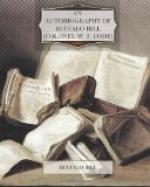CHAPTER VII
One morning, in the spring of 1870, a band of horse-stealing Indians raided four ranches near the mouth of Fremont Creek, on the North Platte. After scooping up horses from these ranches they proceeded to the Fort McPherson herd, which was grazing above the Post, and took about forty Government animals. Among these was my favorite little pony, Powder Face.
When the alarm was given, “Boots and Saddles” was sounded. I always kept one of my best horses by me, and was ready for any surprise. The horse that I saddled that day was Buckskin Joe.
As I galloped for the herd, I saw the Indians kill two of the herders. Then, circling all the horses toward the west, they disappeared over a range of hills. I hurried back to the camp and told the general that I knew where to pick up the trail. Company I, commanded by a little red-headed chap—Lieutenant Earl D. Thomas—was the first to report, mounted, at the adjutant’s office. Thomas had but lately graduated from West Point.
His sole instructions were: “Follow Cody and be off quick.” As he rode away General Emory called after him: “I will support you with more troops as fast as they are saddled.”
The lieutenant followed me on the run to the spot where I saw the Indians disappear. Though the redskins had an hour and a half start on us, we followed them, on a gallop, till we could see that they had begun to drive their horses in a circle, and then in one direction after another, making the trail uncertain. It was getting dark, but I succeeded in keeping on some of the tracks.
All that night the Indians endeavored, by scattering their horses, to throw us off the trail. At three o’clock in the morning I made up my mind that they were traveling for the headwaters of Medicine Creek, and headed straight in that direction.
We found that they had reached the creek, but remained there only long enough to water their horses. Then they struck off to the southwest. I informed Lieutenant Thomas that the next water was at the Springs at the head of Red Willow Creek, thirty-five miles away. The Indians, I said, would stop there.
Thomas’s men had not had time to bring so much as their coats with them. At the alarm they grabbed their sidearms and carbines and ammunition belts, and leaped into their saddles. None of us had had anything to eat since dinner the day before. In the whole outfit there was not a canteen in which to carry water.
I notified Thomas that he must decide whether the troop was to undergo the terrible hardship of riding a whole day without food or water, on the chance of overtaking the Indians and getting their rations and supplies away from them. He replied that the only instructions he had received from General Emory were to follow me. I said that if it were left to me, I would follow the Indians.
“You have heard Cody,” said Thomas to his men. “Now, I would like to hear what you men think about it.”




